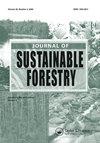孟加拉国一个共同管理保护区的地方一级森林治理和保护成果
IF 1.8
4区 农林科学
Q3 FORESTRY
引用次数: 4
摘要
摘要森林保护区共同管理被认为是改善地方森林治理的可行选择。本研究调查了孟加拉国东南部共同管理的保护区Chunati野生动物保护区(CWS)的地方一级森林治理状况。通过对随机选择的非国家行为者(n = 39)和国家行为者(n = 10)进行访谈,以及与依赖森林的社区进行四次焦点小组讨论,收集了关于八项关键治理原则和森林保护成果的数据。我们进行了t检验,以比较受访者对关键治理原则和保护结果的看法。结果表明,协同治理有助于提高CWS森林的树木和野生动物多样性质量,同时减少了非法砍伐和土地侵占。受访者对关键治理原则的总体看法显示出中高的得分(平均3.33分,满分5.00分)。在森林保护结果方面,得分也从中等到较高(平均3.72分,满分5.00分)。非国家行为体对整体关键治理原则和保护成果的感知程度较高,而国家行为体(非林业官员)的得分较低。这项研究的结果将有助于重塑共同管理政策,以确保孟加拉国和其他地方在地方一级的PA管理中实现良好治理。本文章由计算机程序翻译,如有差异,请以英文原文为准。
Local Level Forest Governance and Conservation Outcomes in a Co-managed Protected Area of Bangladesh
ABSTRACT Co-management of forest protected areas (PA) is considered as a viable option to improve the local-level forest governance. This study examined the state of local-level forest governance in Chunati wildlife sanctuary (CWS), a co-managed PA in south-eastern Bangladesh. Data on eight key principles of governance and forest conservation outcomes were collected by interviewing randomly selected non-state actors (n = 39) and state actors (n = 10) and four focus group discussions with the forest-dependent communities. We conducted a t-test to compare respondents’ perceptions regarding key governance principles and conservation outcomes. Results revealed that co-management governance in CWS assisted to improve the quality of forests in terms of tree and wildlife diversity, while illicit felling and land encroachment had reduced. Respondents’ overall perception on key governance principles showed a moderate-to-high score (mean 3.33 out of 5.00). Regarding forest conservation outcomes, the score was also moderate to high (mean 3.72 out of 5.00). Non-state actors showed fairly higher perception on overall key governance principles and conservation outcomes, while state actors (non-forestry officials) reported lower scores. Findings of this study would be useful to reshape the co-management policies that ensure good governance at local-level management of PA in Bangladesh and elsewhere.
求助全文
通过发布文献求助,成功后即可免费获取论文全文。
去求助
来源期刊

Journal of Sustainable Forestry
Social Sciences-Geography, Planning and Development
CiteScore
3.90
自引率
12.50%
发文量
42
期刊介绍:
Journal of Sustainable Forestry publishes peer-reviewed, original research on forest science. While the emphasis is on sustainable use of forest products and services, the journal covers a wide range of topics from the underlying biology and ecology of forests to the social, economic and policy aspects of forestry. Short communications and review papers that provide a clear theoretical, conceptual or methodological contribution to the existing literature are also included in the journal.
Common topics covered in the Journal of Sustainable Forestry include:
• Ecology, management, recreation, restoration and silvicultural systems of all forest types, including urban forests
• All aspects of forest biology, including ecophysiology, entomology, pathology, genetics, tree breeding, and biotechnology
• Wood properties, forest biomass, bioenergy, and carbon sequestration
• Simulation modeling, inventory, quantitative methods, and remote sensing
• Environmental pollution, fire and climate change impacts, and adaptation and mitigation in forests
• Forest engineering, economics, human dimensions, natural resource policy, and planning
Journal of Sustainable Forestry provides an international forum for dialogue between research scientists, forest managers, economists and policy and decision makers who share the common vision of the sustainable use of natural resources.
 求助内容:
求助内容: 应助结果提醒方式:
应助结果提醒方式:


